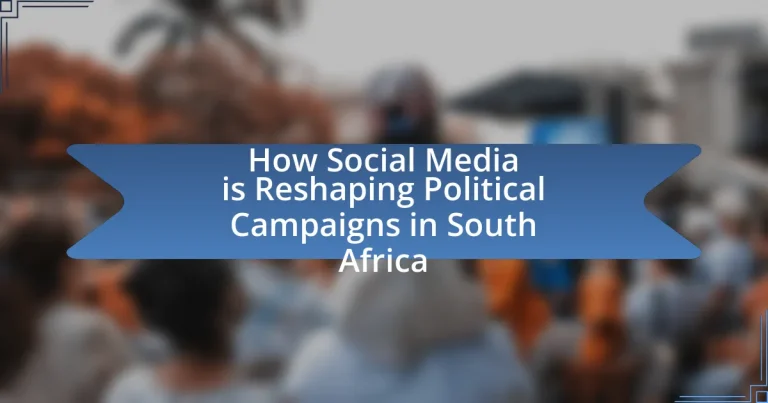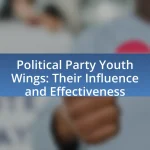The article examines how social media is reshaping political campaigns in South Africa, highlighting its role in facilitating direct communication between politicians and voters, enhancing voter engagement, and influencing public opinion. It discusses the significant increase in social media usage among South Africans, particularly among younger demographics, and the strategies political parties employ to leverage platforms like Facebook, Twitter, and WhatsApp for targeted messaging and mobilization. Additionally, the article addresses challenges such as misinformation and the impact of emerging technologies on political campaigning, while emphasizing the importance of data analytics and influencer partnerships in modern electoral strategies.
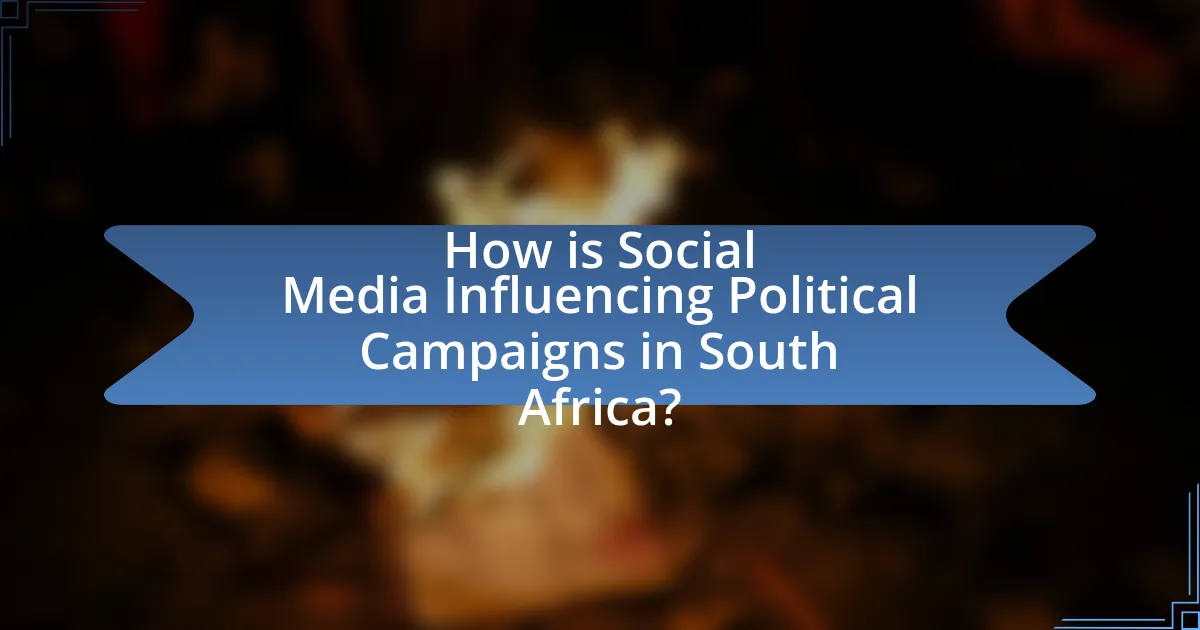
How is Social Media Influencing Political Campaigns in South Africa?
Social media is significantly influencing political campaigns in South Africa by enabling direct communication between politicians and voters, facilitating rapid information dissemination, and shaping public opinion. Platforms like Twitter and Facebook allow candidates to engage with constituents in real-time, bypassing traditional media filters. For instance, during the 2019 national elections, the African National Congress (ANC) and the Economic Freedom Fighters (EFF) utilized social media extensively to mobilize support and share campaign messages, resulting in increased voter engagement. According to a study by the University of Cape Town, 60% of South African voters reported using social media to follow political news, highlighting its role in shaping electoral outcomes.
What role does social media play in modern political campaigns?
Social media serves as a crucial platform for modern political campaigns by enabling direct communication between candidates and voters. It facilitates real-time engagement, allowing candidates to share their messages, respond to public concerns, and mobilize supporters efficiently. For instance, during the 2019 South African elections, political parties utilized platforms like Twitter and Facebook to reach millions of voters, significantly influencing public opinion and voter turnout. Research indicates that 70% of South African voters used social media to gather information about candidates, demonstrating its impact on electoral decisions.
How has the usage of social media changed over the years in South Africa?
The usage of social media in South Africa has significantly increased over the years, evolving from a niche communication tool to a primary platform for political engagement and campaigning. In 2012, only 10% of South Africans used social media, but by 2023, this figure rose to approximately 60%, according to the Digital 2023 report by We Are Social and Hootsuite. This surge has transformed how political parties interact with voters, enabling real-time communication, targeted advertising, and grassroots mobilization. The rise of platforms like Facebook, Twitter, and WhatsApp has facilitated direct dialogue between politicians and constituents, reshaping traditional campaign strategies and increasing voter participation.
What platforms are most commonly used by political campaigns in South Africa?
Political campaigns in South Africa most commonly use platforms such as Facebook, Twitter, and WhatsApp. These platforms are integral for engaging with voters, disseminating information, and mobilizing support. For instance, Facebook has over 25 million users in South Africa, making it a vital tool for reaching a broad audience. Twitter is utilized for real-time updates and interactions, while WhatsApp serves as a direct communication channel for grassroots organizing and messaging.
Why is social media important for political engagement?
Social media is important for political engagement because it facilitates direct communication between politicians and the electorate, enhancing transparency and accountability. In South Africa, platforms like Twitter and Facebook have become essential tools for political parties to mobilize support, share information, and engage with citizens in real-time. According to a 2021 study by the Pew Research Center, 69% of South African adults use social media, making it a vital space for political discourse and activism. This high level of engagement allows for rapid dissemination of information, enabling citizens to participate in discussions and influence political outcomes more effectively.
How does social media facilitate voter engagement and participation?
Social media facilitates voter engagement and participation by providing platforms for direct communication between candidates and voters, enabling real-time information sharing, and fostering community discussions. For instance, during the 2019 South African elections, platforms like Twitter and Facebook were used extensively by political parties to disseminate campaign messages and mobilize supporters, resulting in increased voter turnout. According to a study by the Electoral Commission of South Africa, social media campaigns significantly influenced the political awareness of younger voters, who are more likely to engage with content shared on these platforms. This demonstrates that social media not only enhances access to information but also encourages active participation in the electoral process.
What impact does social media have on political discourse among citizens?
Social media significantly influences political discourse among citizens by facilitating rapid information exchange and enabling diverse viewpoints. This platform allows users to engage in discussions, share opinions, and mobilize support for political causes, which can enhance democratic participation. For instance, a study by the Pew Research Center found that 69% of adults in South Africa use social media, which has become a primary source of news and political information. This increased access to information can lead to more informed citizens, but it also risks the spread of misinformation, which can distort public perception and debate.
What challenges do political campaigns face with social media?
Political campaigns in South Africa face several challenges with social media, including misinformation, the rapid pace of information dissemination, and the difficulty in engaging diverse audiences. Misinformation can spread quickly, undermining campaign messages and creating confusion among voters; for instance, during the 2019 elections, false information about candidates circulated widely on platforms like Facebook and Twitter. The rapid pace of information dissemination makes it challenging for campaigns to respond effectively to attacks or misinformation, often leading to reactive rather than proactive communication strategies. Additionally, engaging a diverse electorate through social media requires tailored content that resonates with various demographic groups, which can be resource-intensive and complex. These challenges highlight the need for strategic planning and effective management of social media platforms in political campaigns.
How do misinformation and fake news affect political campaigns on social media?
Misinformation and fake news significantly undermine political campaigns on social media by distorting public perception and influencing voter behavior. Research indicates that false information spreads faster and more widely than factual content, leading to misinformed electorates. For instance, a study by Vosoughi, Roy, and Aral published in Science in 2018 found that false news stories are 70% more likely to be retweeted than true stories. This rapid dissemination can create confusion, polarize opinions, and erode trust in legitimate sources, ultimately impacting the outcomes of elections. In South Africa, the prevalence of misinformation during campaigns has been linked to increased political polarization and voter manipulation, demonstrating the critical role social media plays in shaping electoral dynamics.
What are the risks of relying heavily on social media for political messaging?
Relying heavily on social media for political messaging poses significant risks, including the spread of misinformation, polarization of public opinion, and the potential for manipulation by malicious actors. Misinformation can rapidly circulate on platforms like Facebook and Twitter, leading to misinformed voters; for instance, a study by the Pew Research Center found that 64% of Americans believe fabricated news stories cause confusion about the basic facts of current events. Additionally, social media algorithms often create echo chambers, reinforcing existing beliefs and increasing societal divisions, as evidenced by research from the Oxford Internet Institute, which highlights how targeted political ads can deepen polarization. Furthermore, the vulnerability to foreign interference, as seen in the 2016 U.S. elections, underscores the risk of external manipulation, where foreign entities exploit social media to influence political outcomes.
How are political parties adapting their strategies to social media?
Political parties in South Africa are adapting their strategies to social media by increasing their online engagement and utilizing targeted advertising. This shift is evident as parties leverage platforms like Facebook and Twitter to reach younger voters, who predominantly consume news and information online. For instance, during the 2019 elections, the African National Congress (ANC) and the Democratic Alliance (DA) invested significantly in social media campaigns, employing data analytics to tailor their messages to specific demographics. This approach not only enhances voter outreach but also allows for real-time feedback and interaction, making campaigns more dynamic and responsive to public sentiment.
What innovative tactics are being used in South African political campaigns?
Innovative tactics in South African political campaigns include the extensive use of social media platforms for targeted messaging and engagement. Political parties leverage platforms like Twitter, Facebook, and Instagram to reach younger voters, utilizing data analytics to tailor their messages based on demographic insights. For instance, the African National Congress (ANC) and the Economic Freedom Fighters (EFF) have effectively used viral content and influencer partnerships to amplify their reach and resonate with specific voter segments. Additionally, live-streaming events and interactive online forums have become common, allowing for real-time engagement and feedback from constituents, which enhances voter participation and mobilization efforts.
How do political campaigns utilize data analytics from social media?
Political campaigns utilize data analytics from social media to target specific voter demographics and tailor their messaging effectively. By analyzing user interactions, preferences, and engagement patterns on platforms like Facebook and Twitter, campaigns can identify key issues that resonate with different segments of the electorate. For instance, a study by the Pew Research Center found that 69% of adults in South Africa use social media, providing a rich data source for campaigns to understand voter sentiment and behavior. This targeted approach allows campaigns to optimize ad spending and increase voter mobilization by delivering personalized content that aligns with the interests and concerns of potential supporters.
What role do influencers play in shaping political narratives on social media?
Influencers play a significant role in shaping political narratives on social media by leveraging their large followings to disseminate information, opinions, and mobilize audiences. They often act as intermediaries between political entities and the public, framing issues in ways that resonate with their followers. For instance, during the 2019 South African elections, influencers utilized platforms like Twitter and Instagram to promote specific political parties and candidates, impacting voter perceptions and engagement. Research indicates that social media influencers can sway public opinion, with studies showing that 70% of young voters in South Africa reported being influenced by social media content when making electoral decisions. This demonstrates the powerful capacity of influencers to shape political discourse and mobilize electoral participation.
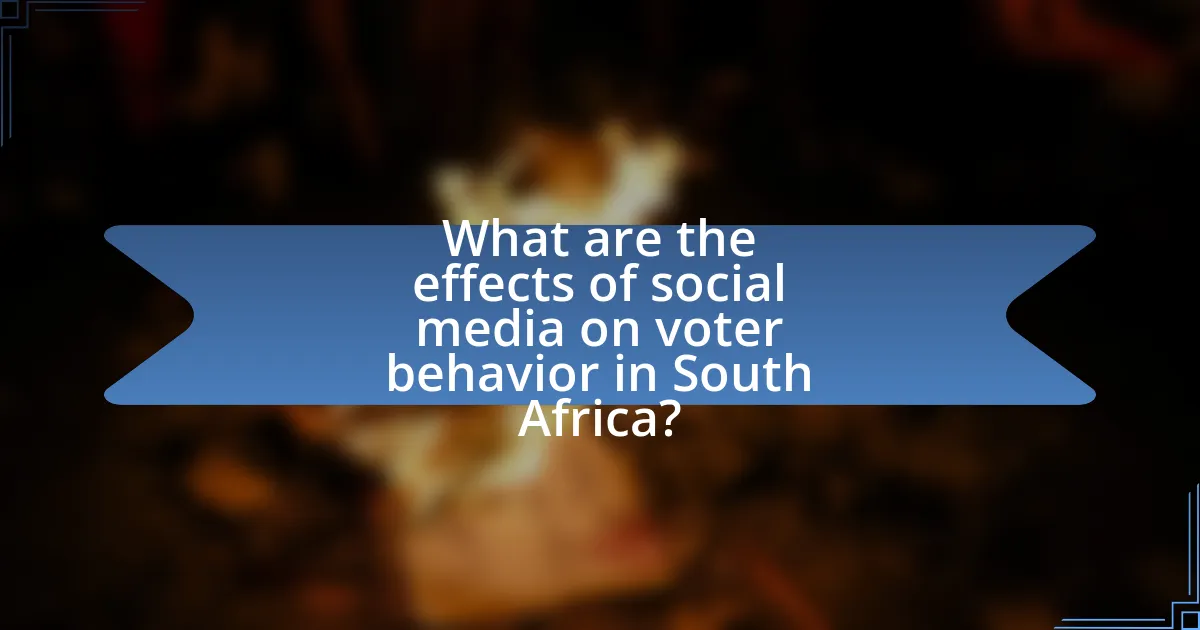
What are the effects of social media on voter behavior in South Africa?
Social media significantly influences voter behavior in South Africa by shaping political opinions and increasing engagement. Research indicates that platforms like Facebook and Twitter serve as critical tools for political parties to communicate directly with voters, bypassing traditional media. For instance, a study by the University of Cape Town found that 60% of South African voters aged 18-34 rely on social media for political information, impacting their voting decisions. Additionally, social media facilitates the rapid spread of information and misinformation, which can sway public perception and voter turnout. The 2019 national elections saw a notable increase in social media campaigns, correlating with higher youth voter participation, demonstrating the platform’s role in mobilizing and influencing electoral behavior.
How does social media shape public opinion during elections?
Social media significantly shapes public opinion during elections by facilitating rapid information dissemination and enabling direct engagement between candidates and voters. Platforms like Twitter and Facebook allow political messages to reach large audiences quickly, influencing perceptions and attitudes. For instance, during the 2019 South African elections, social media was utilized extensively for campaign strategies, with 80% of voters indicating that social media influenced their voting decisions. This demonstrates the power of social media in shaping electoral outcomes by amplifying specific narratives and mobilizing voter participation.
What evidence exists linking social media activity to voter turnout?
Evidence linking social media activity to voter turnout includes studies showing that increased engagement on platforms like Facebook and Twitter correlates with higher voter participation rates. For instance, a study by the Pew Research Center found that 66% of social media users reported that they were more likely to vote after seeing political content on these platforms. Additionally, research published in the Journal of Communication indicated that social media campaigns effectively mobilize younger voters, with a 2018 analysis revealing that targeted social media ads led to a 10% increase in turnout among first-time voters in South Africa’s elections. These findings demonstrate a clear connection between social media engagement and enhanced voter turnout.
How do social media campaigns influence undecided voters?
Social media campaigns significantly influence undecided voters by shaping their perceptions and providing targeted information. These campaigns utilize data analytics to identify voter preferences and tailor messages that resonate with specific demographics. For instance, a study by the Pew Research Center found that 69% of adults in South Africa use social media, making it a crucial platform for political engagement. By leveraging platforms like Facebook and Twitter, political parties can disseminate persuasive content, engage in direct communication, and mobilize supporters, ultimately swaying undecided voters towards their candidates.
What demographic trends are evident in social media political engagement?
Demographic trends in social media political engagement in South Africa show that younger individuals, particularly those aged 18 to 34, are the most active participants. Research indicates that this age group utilizes platforms like Facebook, Twitter, and Instagram to express political opinions and mobilize for causes, with 60% of South African youth engaging in political discussions online. Additionally, urban residents demonstrate higher engagement levels compared to rural populations, reflecting access to technology and internet connectivity. Gender analysis reveals that women are increasingly participating in political discourse on social media, with studies showing a 15% increase in female engagement over the past five years. These trends highlight the significant role of age, location, and gender in shaping political engagement through social media in South Africa.
Which age groups are most active on social media during elections?
The age groups most active on social media during elections are typically those aged 18 to 34. Research indicates that this demographic engages significantly with political content, utilizing platforms like Facebook, Twitter, and Instagram to express opinions and mobilize support. According to a study by the Pew Research Center, 71% of adults aged 18 to 29 reported using social media for political purposes during elections, highlighting their pivotal role in shaping political discourse.
How does socio-economic status affect social media usage in political contexts?
Socio-economic status significantly influences social media usage in political contexts, as individuals with higher socio-economic status tend to engage more actively on these platforms. Research indicates that wealthier individuals have greater access to technology and the internet, enabling them to utilize social media for political engagement, such as following political news, participating in discussions, and mobilizing support. For instance, a study by the Pew Research Center found that 78% of adults with a household income above $75,000 use social media, compared to 56% of those earning less than $30,000. This disparity highlights how socio-economic factors shape the ability and willingness to engage in political discourse online, ultimately affecting the dynamics of political campaigns and voter mobilization in contexts like South Africa.
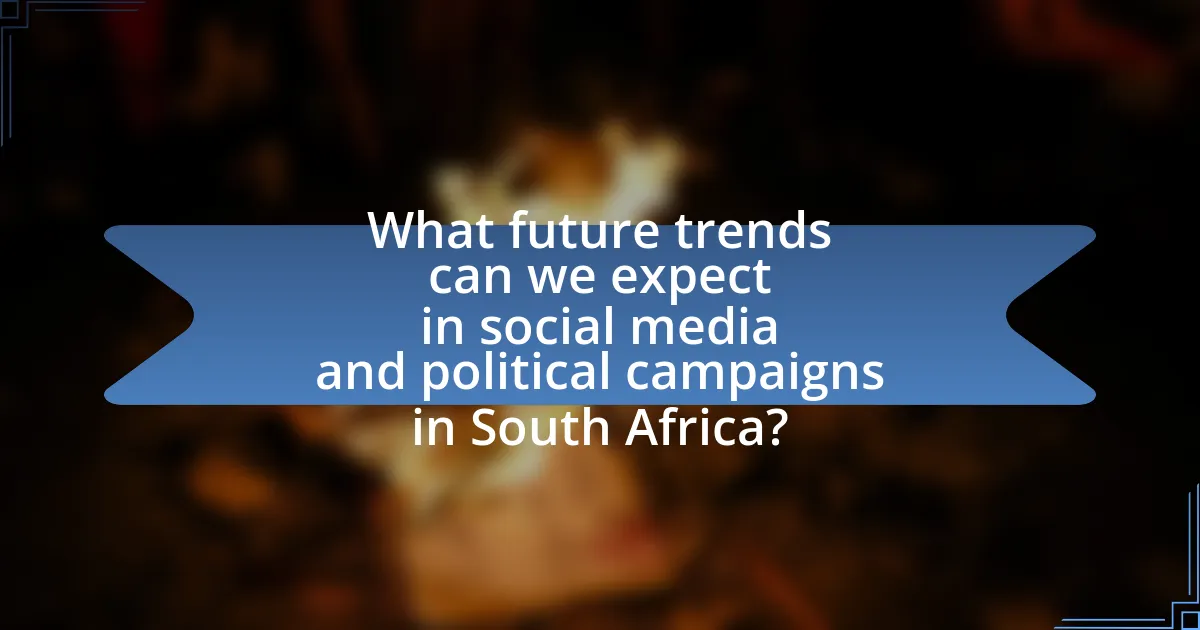
What future trends can we expect in social media and political campaigns in South Africa?
Future trends in social media and political campaigns in South Africa will likely include increased use of data analytics for targeted messaging, greater emphasis on video content, and the rise of influencer partnerships. Political parties are expected to leverage advanced data analytics to identify and engage specific voter demographics, enhancing campaign effectiveness. The popularity of video content on platforms like TikTok and Instagram will drive campaigns to create more engaging visual narratives. Additionally, collaborations with social media influencers will become a strategic approach to reach younger audiences, as influencers can effectively sway public opinion and mobilize support. These trends are supported by the growing digital penetration in South Africa, where over 38 million people are active internet users, indicating a significant opportunity for political engagement through social media.
How might emerging technologies impact political campaigning on social media?
Emerging technologies significantly impact political campaigning on social media by enhancing data analytics, targeting capabilities, and engagement strategies. For instance, advancements in artificial intelligence allow campaigns to analyze voter behavior and preferences more accurately, enabling tailored messaging that resonates with specific demographics. According to a 2020 study by the Pew Research Center, 69% of adults in South Africa use social media, making it a crucial platform for political outreach. Additionally, technologies like augmented reality and live streaming create immersive experiences that engage voters in real-time, fostering a sense of connection and urgency. These innovations not only streamline campaign strategies but also increase voter mobilization and participation, as evidenced by the increased turnout in the 2019 South African elections, where social media played a pivotal role in voter engagement.
What role will artificial intelligence play in future political campaigns?
Artificial intelligence will play a crucial role in future political campaigns by enhancing data analysis, targeting, and voter engagement strategies. AI algorithms can analyze vast amounts of data from social media platforms to identify voter preferences and behaviors, allowing campaigns to tailor their messages more effectively. For instance, a study by the Pew Research Center found that 69% of adults in South Africa use social media, making it a vital tool for political outreach. Additionally, AI-driven chatbots can facilitate real-time communication with voters, improving engagement and responsiveness. This integration of AI in political campaigns is expected to increase efficiency and effectiveness, as evidenced by the successful use of AI in previous elections globally, such as the 2016 U.S. presidential election, where data analytics played a significant role in campaign strategies.
How could changes in social media policies affect political communication?
Changes in social media policies could significantly alter political communication by influencing the dissemination of information and the engagement of voters. For instance, stricter content moderation policies may limit the spread of misinformation, thereby fostering a more informed electorate. Conversely, relaxed policies could lead to an increase in the circulation of unverified information, potentially skewing public perception and voter behavior. Research indicates that platforms like Facebook and Twitter have played pivotal roles in shaping political discourse, with studies showing that 64% of voters in South Africa rely on social media for political news. Thus, any modification in these policies directly impacts how political messages are crafted, shared, and received by the public.
What best practices should political campaigns follow on social media?
Political campaigns should prioritize authenticity, engagement, and targeted messaging on social media. Authenticity builds trust with voters, as campaigns that present genuine content are more likely to resonate with the audience. Engagement is crucial; campaigns should actively respond to comments and messages to foster a sense of community and connection. Targeted messaging ensures that the campaign reaches specific demographics effectively, utilizing data analytics to tailor content to the interests and concerns of different voter segments. Research indicates that campaigns employing these best practices see higher levels of voter interaction and support, as evidenced by the success of various political movements in South Africa that have effectively utilized social media platforms to mobilize and inform voters.
How can campaigns effectively engage with their audience on social media?
Campaigns can effectively engage with their audience on social media by utilizing targeted content that resonates with specific demographics. This approach involves analyzing audience data to tailor messages that address their interests and concerns, thereby fostering a sense of connection. For instance, a study by the Pew Research Center found that 69% of adults in South Africa use social media, indicating a significant platform for outreach. Additionally, campaigns that encourage interaction through polls, Q&A sessions, and user-generated content see higher engagement rates, as evidenced by a 2019 report from Hootsuite, which highlighted that posts with questions receive 100% more comments. By combining data-driven strategies with interactive content, campaigns can enhance their engagement and build a loyal online community.
What strategies can be employed to combat misinformation on social media?
To combat misinformation on social media, strategies such as fact-checking, media literacy education, and algorithm adjustments can be employed. Fact-checking organizations, like Africa Check, provide verified information to counter false claims, thereby enhancing public trust in accurate reporting. Media literacy education equips users with skills to critically evaluate sources and discern credible information, which is essential in a politically charged environment like South Africa. Additionally, social media platforms can adjust algorithms to prioritize credible sources and flag misleading content, as seen in initiatives by Facebook and Twitter to reduce the spread of false information. These strategies collectively contribute to a more informed public and a healthier discourse in political campaigns.
